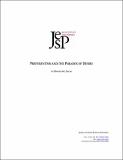Preferentism and the Paradox of Desire
Author(s)
Skow, Bradford
DownloadF7898B82d01.pdf (215.3Kb)
PUBLISHER_POLICY
Publisher Policy
Article is made available in accordance with the publisher's policy and may be subject to US copyright law. Please refer to the publisher's site for terms of use.
Terms of use
Metadata
Show full item recordAbstract
The basic idea behind actualist preferentism is that getting what one wants makes one's life go better. A recent objection to preferentism is the "paradox of desire." In a nutshell, this objection goes like this. I can certainly desire to be badly off. But if a desire-satisfaction theory of welfare is true, then---under certain assumptions---the hypothesis that I desire to be badly off entails a contradiction. So much the worse for desire-satisfaction theories of welfare.
In this paper I show how to formulate preferentism so that the hypothesis that I desire to be badly off does not entail a contradiction. The key is to allow how close someone's desires are to being satisfied to play a role in determining their level of welfare. My version of preferentism implements this idea by allowing desire satisfaction to come in degrees.
Date issued
2009-09Department
Massachusetts Institute of Technology. Department of Linguistics and PhilosophyJournal
Journal of Ethics and Social Philosophy
Publisher
University of Southern California
Citation
Bradford Skow, "Preferentism and the Paradox of Desire," Journal of Ethics & Social Philosophy, www.jesp.org, (September 2009), vol. 3 no. 3.
Version: Final published version
ISSN
1559-3061